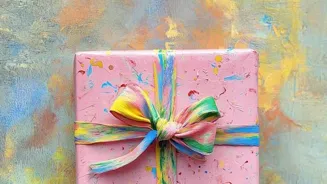Unveiling the profound link between art and happiness, discover 10 insights into finding joy through creativity. Dive in to explore!
In a world often obsessed with material possessions and relentless productivity,
it's easy to overlook the simple yet profound connection between art and happiness.
Whether you're a seasoned artist or someone who believes they "can't even draw a straight line," engaging with art in various forms can unlock a wellspring of joy and improve your overall well-being.
This article delves into ten key insights that reveal how art contributes to a happier, more fulfilling life, tailored for the Indian reader.
Art as a Form of Self-Expression: Finding Your Voice
Art provides an outlet for emotions and thoughts that words sometimes fail to capture. Think of it as a dialogue with yourself, a way to externalize your inner world.
Whether it's painting a vibrant sunset reflecting your hope, sculpting a form representing your strength, or writing a poem about your connection to nature, art allows you to communicate your unique perspective.
This act of self-expression, of giving form to the intangible, is inherently empowering and contributes to a stronger sense of self. In a culture where we are often encouraged to conform, art celebrates individuality and allows you to embrace your authentic voice.
Discovering your personal artistic language can be a deeply satisfying journey, leading to increased self-awareness and acceptance, key ingredients of happiness.
Art Reduces Stress and Anxiety: A Sanctuary for the Mind
Modern life, with its constant demands and digital overload, can leave us feeling stressed and anxious. Engaging in art acts as a powerful antidote.
The act of creating, whether it's meticulously drawing a mandala, carefully arranging flowers in a Rangoli, or strumming a simple tune on a guitar, shifts your focus away from worries and into the present moment.
This "flow state," where you are fully immersed in the activity, effectively quiets the mental chatter and allows your mind to relax. Studies have shown that even a short art session can lower cortisol levels, the hormone associated with stress.
Think of art as a form of meditation, a peaceful sanctuary where you can escape the pressures of daily life and reconnect with your inner calm.
Even coloring books for adults have become popular for this very reason, offering a simple and accessible way to experience the stress-reducing benefits of art.
Art Fosters Creativity and Problem-Solving: Thinking Outside the Box
Art is not just about creating pretty pictures; it's about developing your creative thinking skills. Every artistic endeavor, from designing a Diwali decoration to composing a new recipe, requires you to think outside the box, experiment with different approaches, and find innovative solutions.
This process of creative problem-solving is not only valuable in art but also spills over into other areas of your life. When you practice creative thinking in art, you become more adaptable, resourceful, and better equipped to handle challenges in your personal and professional life.
Art challenges you to see the world in new ways, to question assumptions, and to come up with original ideas, fostering a mindset of continuous learning and growth. This enhanced creativity contributes to a sense of competence and accomplishment, boosting your self-esteem and overall happiness.
Art Connects Us to Culture and Heritage: A Sense of Belonging
India has a rich and diverse artistic heritage, from the intricate patterns of Madhubani paintings to the mesmerizing rhythms of classical music. Engaging with traditional art forms connects us to our cultural roots, fostering a sense of belonging and pride.
Learning about these art forms allows us to appreciate the wisdom and creativity of past generations. It deepens our understanding of our own identity and strengthens our connection to our community.
Whether you're taking a Kathak dance class, learning to play the sitar, or simply visiting a local art museum, immersing yourself in Indian art can be a profoundly enriching experience that nourishes your soul and instills a sense of belonging.
This connection to culture and heritage provides a sense of stability and continuity, contributing to a feeling of rootedness and happiness.
Art Enhances Empathy and Understanding: Seeing the World Through Others' Eyes
Art has the power to transcend cultural boundaries and connect us to the human experience on a deeper level. By exposing ourselves to art from different cultures and perspectives, we develop a greater understanding of others and their experiences.
Whether it's watching a documentary about a social issue, reading a novel by an author from a different background, or viewing a painting that depicts a different way of life, art can broaden our horizons and challenge our preconceived notions.
This exposure to different perspectives fosters empathy and compassion, allowing us to relate to others with greater understanding and kindness.
Developing empathy is not only a moral imperative but also a key ingredient of happiness, as it allows us to build stronger relationships and contribute to a more inclusive and harmonious society.
Art Promotes Mindfulness and Presence: Living in the Moment
The practice of art, in any form, encourages mindfulness and presence. When you are truly engaged in the act of creating, you are fully present in the moment, completely absorbed in the task at hand.
This mindful focus can be incredibly therapeutic, allowing you to detach from worries about the past or anxieties about the future.
Whether you're sketching a flower, playing a musical instrument, or writing in a journal, art allows you to savor the present moment and appreciate the beauty that surrounds you.
Cultivating mindfulness is a powerful tool for reducing stress and increasing happiness, as it allows you to appreciate the simple joys of life and find contentment in the present.
Painting, sketching and drawing help your brain and allow you to feel happiness as there is something you are creating with your own hands. It can also help heal. Dancing, cooking or even something as simple as helping in the kitchen are all forms of art which help one feel calm.
So these activities help one to be happy.
Art Builds Confidence and Self-Esteem: Embracing Imperfection:
Creating something, anything, from scratch is an accomplishment. It doesn't matter if you consider yourself "good" at art or not. The act of bringing an idea to life, of transforming a blank canvas or a lump of clay into something tangible, can be incredibly empowering.
Each time you create something, you are proving to yourself that you are capable of creativity, innovation, and self-expression. This sense of accomplishment builds confidence and self-esteem. Art also teaches you to embrace imperfection. Not every creation will be a masterpiece, and that's okay.
The process of learning, experimenting, and making mistakes is just as valuable as the final product. Embracing imperfection allows you to let go of self-criticism and appreciate the journey of creation.
Art Provides a Sense of Purpose and Meaning: Connecting to Something Larger Than Yourself:
For many people, art provides a sense of purpose and meaning in life. It allows them to connect to something larger than themselves, whether it's a cultural tradition, a spiritual belief, or a personal passion.
Creating art can be a way to explore your values, express your beliefs, and contribute to the world in a meaningful way.
Whether you're painting murals in your community, writing poems about social justice, or simply sharing your art with others, you can use your creativity to make a positive impact. This sense of purpose and meaning is essential for a fulfilling and happy life.
Art Fosters Social Connection and Community: Sharing Your Passion with Others:
Art is not just a solitary activity; it can also be a powerful way to connect with others. Joining an art class, a book club, or a choir provides opportunities to meet like-minded people, share your passion, and build meaningful relationships.
Sharing your art with others can also be incredibly rewarding, whether it's exhibiting your paintings, performing in a concert, or simply sharing your creations on social media. Receiving positive feedback and support from others can boost your confidence and inspire you to continue creating.
The sense of community and belonging that art provides can be a powerful antidote to loneliness and isolation.
Art is Accessible to Everyone: Finding Your Own Path to Creativity:
The beauty of art is that it is accessible to everyone, regardless of age, skill level, or background. You don't need to be a trained artist to experience the benefits of art. There are countless ways to incorporate art into your life, from doodling in a notebook to visiting a local art gallery.
The key is to find activities that you enjoy and that allow you to express your creativity. Experiment with different mediums, explore different styles, and don't be afraid to make mistakes. The most important thing is to have fun and to allow yourself to be creative.
Whether you're a seasoned artist or a complete beginner, art has the power to enrich your life and bring you joy.
AI Generated Content. Glance/InMobi shall have no liability for the content











